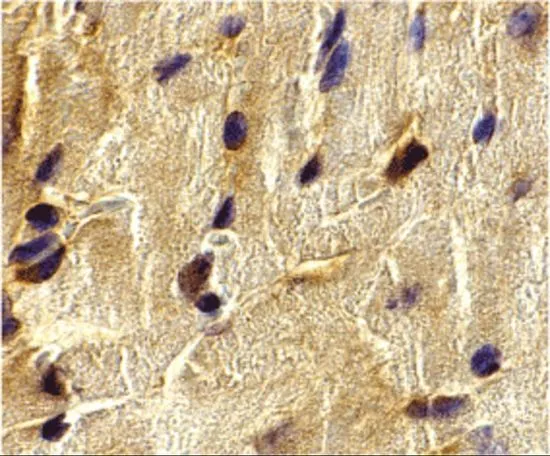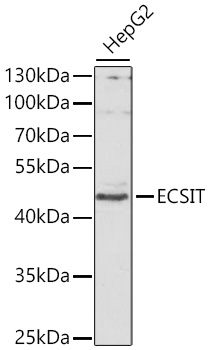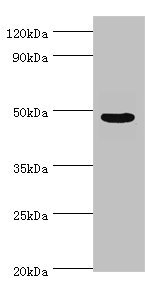
IHC-P analysis of mouse heart tissue using GTX85081 ECSIT antibody. Working concentration : 2 μg/ml
ECSIT antibody
GTX85081
ApplicationsWestern Blot, ELISA, ImmunoHistoChemistry, ImmunoHistoChemistry Paraffin
Product group Antibodies
ReactivityHuman, Mouse
TargetECSIT
Overview
- SupplierGeneTex
- Product NameECSIT antibody
- Delivery Days Customer9
- Application Supplier NoteWB: 0.5 - 2 microg/mL. IHC-P: 2 microg/mL. *Optimal dilutions/concentrations should be determined by the researcher.Not tested in other applications.
- ApplicationsWestern Blot, ELISA, ImmunoHistoChemistry, ImmunoHistoChemistry Paraffin
- CertificationResearch Use Only
- ClonalityPolyclonal
- Concentration1 mg/ml
- ConjugateUnconjugated
- Gene ID51295
- Target nameECSIT
- Target descriptionECSIT signaling integrator
- Target synonymsSITPEC, evolutionarily conserved signaling intermediate in Toll pathway, mitochondrial, ECSIT homolog, ECSIT signalling integrator, likely ortholog of mouse signaling intermediate in Toll pathway evolutionarily conserved
- HostRabbit
- IsotypeIgG
- Protein IDQ9BQ95
- Protein NameEvolutionarily conserved signaling intermediate in Toll pathway, mitochondrial
- Scientific DescriptionActivation of NF-?B as a result of Toll-like receptor (TLR) and IL-1 receptor signaling is a major component of innate immune responses (reviewed in 1). Signals from these receptors are relayed by a number of adapter molecules such as TRIF, TIRAP, and MyD88 (2) to kinases such as IRAK (3) and other intermediates such as TNF receptor associated factor (TRAF)-6 (4). ECSIT (evolutionarily conserved signaling intermediate in Toll pathways) was initially identified as a cytoplasmic protein interacting specifically with TNF receptor associated factor (TRAF)-6 in the TLR pathway (5). Recently however, ECSIT has also been shown to be required for bone morphogenetic protein (Bmp) signaling and mesoderm formation during mouse embryogenesis (6), indicating the possibility of cross-talk between the TLR/IL-B and Bmp signaling pathways.
- ReactivityHuman, Mouse
- Storage Instruction-20°C or -80°C,2°C to 8°C
- UNSPSC41116161






